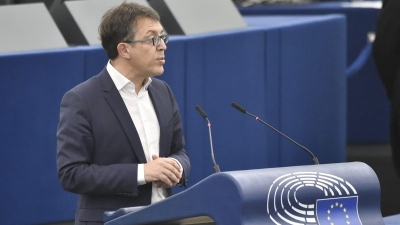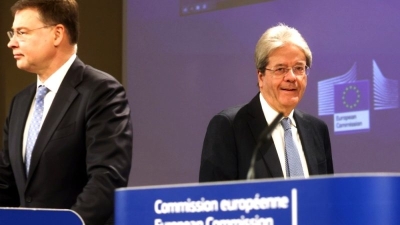Stakeholders bicker over EU tender on tobacco control policy

A €3 million tender for research services related to the implementation of the EU’s tobacco control policy which aims to create a ‘tobacco-free generation’ was granted to the European Network for Smoking Prevention (ENSP) – the only tender bid – in a move that is being criticised by centre-right MEP Sara Skyttedal (EPP) as a conflict of interest.
The €3 million tender is offered by the European Health and Digital Executive Agency (HaDEA) for research and consultancy services related to the implementation of the EU’s tobacco control policy and of Europe’s Beating Cancer Plan, which, among others, aims at creating a ‘Tobacco-Free Generation’ where less than 5% of the population uses tobacco by 2040.
The only candidate for the tender, which according to a Commission official, was only promoted on Twitter and LinkedIn, was a consortium composed of the European Network for Smoking Prevention (ENSP), the University of Crete, and Open Evidence.
The lack of other bids is unlikely among these types of tenders and has raised eyebrows among stakeholders.
The consortium will contribute to the Commission’s tobacco policy development by providing legal, statistical, economic and health assessments of tobacco and novel tobacco products.
ENSP is a key stakeholder in advocating for the cohesive regulation of (novel) tobacco products across the EU. Contributing with a €9,000 sponsorship, ENSP is also a key partner in a European Citizens Initiative whim aims at ending the sale of tobacco and nicotine products to citizens born since 2010 and achieving a tobacco-free environment by 2030.
Conflict of interest?
The conflict of interest here is “quite obvious”, MEP Sara Skyttedal told EURACTIV, affirming that ENSP may influence a stricter regulation of noble tobacco products, hindering smokers’ shift from cigarettes to healthier products.
On 17 April, Skyttedal sent a question for written answer to the Commission on the subject of the conflict of interest in tobacco control. She has yet to receive a response.
“How can groups who have adopted clear positions against new nicotine products and publicly lobbied to restrict these products, be expected to deliver a fair and unbiased assessment of the opportunity these products pose to reduce the harm of smoking?” she added.
Skyttedal believes that helping smokers switch from cigarettes – as well as bringing down the rate of tobacco-related mortality – will be “missed” as the process in which new laws are developed is being run by people who have firm stances against smoking alternatives, which could put the progress of the EU’s Beating Cancer plan at risk.
Additionally, the Commission has demonstrated its bias in this case, according to Skyttedal.
In order for the Commission to ensure there are different views on the regulation of tobacco control, they should consider all sides in this debate, but they must take particular account of the voices of people who are trying to quit smoking by using alternatives, Skyttedal said, adding that they should take also listen to countries that have been able to become smoke-free, like Sweden.
ENSP: Conflict of interest not applicable
For its part, ENSP says that they do not have any conflict of interest in this case.
“The role of the ENSP is to provide expertise on the technical and scientific matters related to Tobacco Control. The ENSP, nor any other member of the consortium for that matter, is in charge of policy design,” ENSP Secretary General Cornel Radu-Loghin told EURACTIV.
Additionally, the “very concept” of conflict of interest is not applicable to a non-profit organisation with “no economic interest whatsoever in the tobacco business,” said Radu-Loghin, adding that ENSP can provide the Commission with “worldwide appreciated experts with outstanding academic backgrounds and experience.”
“We are proud that we contributed to almost all current regulations regarding tobacco and nicotine products,” said Radu-Loghin, adding that they look forward to stricter regulations against “deadly and addictive products.”
According to the tender documents, the contract aims to provide technical, scientific, and legal support to the Commission with regard to their tobacco-control policies and legislation to “help strengthen their quality, efficiency, and impact,” Radu-Loghin told EURACTIV.
The Commission’s stance
Asked by EURACTIV, an official defended the Commission’s “crucial priority” to avoid conflicts of interest, especially in the tobacco control portfolio, and reminded that the Commission is ensuring a transparent and open policy implementation and development in line with the Better Regulation principles.
“This fully transparent evaluation process enables all stakeholders, consumers and the general public to provide evidence and to express their views on the EU tobacco-control rules and be involved in policy-making,” the Commission official said.
As part of the contract, the official reminded, ENSP and its partners signed a Declaration on honour and an additional absence of conflict of interest in the field of tobacco and are obliged to notify of any conflict of interest arising in the future.
Novel products, such as heated tobacco, electronic cigarettes, nicotine pouches or snus, have emerged as an alternative to traditional smoking, which causes 700,000 deaths in Europe annually.
Backers of such products say they are much less harmful compared to traditional cigarettes while opponents say that they are still harmful and that, above all, we don’t know their long-term effects given they only recently entered the market.
Contrary to Skyttedal, Italian MEP Alessandra Moretti told EURACTIV last October that scientists “know for sure” that novel alternative tobacco and nicotine products are harmful.
“If we do not know the long-term effects with certainty, we cannot establish that they are harmless,” she told EURACTIV Italy.
“To date, we know for sure that they are harmful tools. The medium to long-term effects we will have in the short term, and unfortunately, I fear we will have scientific evidence confirming their harmfulness to health,” Moretti warned.
Read more: Debate heats up over novel tobacco and nicotine products’ harmfulness
(Max Griera, Sofia Leeson | EURACTIV.com – Edited by Sarantis Michalopoulos)
Read more with EURACTIV




